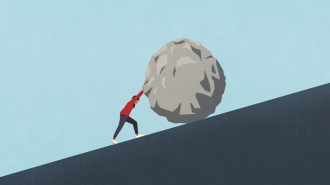Mental disorders don’t hinder headache treatment
Contrary to long-standing thinking, medications may offer comparable headache relief to those with and without mental disorders.
For an especially miserable time, mix recurring headaches with depression, anxiety or both. But people in such a fix have cause for optimism, courtesy of a team led by psychologist Bernadette Heckman of Ohio University in Athens.
Drug treatments for headaches work just as well for patients with these psychiatric disorders as for those with no such problems, Heckman and her colleagues report in the November Pain.
Researchers and clinicians generally assume that the presence of one or more psychiatric ailments worsens headache symptoms and thus the prospects for successful treatment. Heckman and her colleagues conducted one of the few prospective studies to test that conviction.
“Contrary to conventional clinical wisdom, many patients with psychiatric disorders responded favorably to headache treatment,” Heckman says.
The team found that, during six months of treatment at any of four outpatient headache clinics, rates of improvement in headache frequency and intensity were about the same for patients with depression, anxiety, a combination of the two or no psychiatric disorders.
In a comment published with the new study, psychologist Todd Smitherman of the University of Mississippi in Oxford and psychiatrist Donald Penzien of the University of Mississippi Medical Center in Jackson say that the new findings “give us pause to reconsider our earlier predictions” that people with mental disorders respond poorly to headache treatment.
Those predictions largely relied on studies that linked psychiatric disorders to chronic headaches and to higher costs for headache treatment, suggesting that mental ailments interfere with headache interventions, they note.
Further research must establish whether the new results apply to the entire spectrum of patients treated at headache specialty clinics and to patients with mental disorders other than depression and anxiety, Smitherman and Penzien caution.
Heckman’s team studied 223 patients who were prescribed headache-prevention medications that they had not previously taken. Most volunteers experienced frequently recurring migraine headaches or tension-type headaches, thought to result largely from stress. Symptoms ranged from mild to moderate.
An estimated 13 percent of the U.S. population suffers from migraines, which are characterized by throbbing head pain often accompanied by nausea and sensitivity to light and sound. Light flashes, blind spots and other “aura” symptoms can also occur. About 3 out of 4 people experience the vice-like grip of tension-type headaches at some point in their lives.
Structured telephone interviews conducted by the experimenters indicated that two-thirds of the patients studied — 147 individuals — suffered from depression, anxiety or a combination of the two at the start of treatment.
Patients kept daily headache diaries for the first month of treatment. Medical evaluations occurred one month and six months into treatment.
Prescribed headache medications included migraine-specific drugs such as triptans, anticonvulsants, antidepressants, analgesics and beta-blockers.
Upon starting treatment, patients with one or more mental disorders reported about 19 days per month with headaches. Those without depression and anxiety reported about 15 headache days per month.
Over the next six months, both groups displayed comparable declines in headaches per month, reductions of headache severity, lessening of headache-related disability and improvements in quality of life.
Treatment effects were modest, though. On average, patients spent about one fewer day per month with a headache during the six-month follow-up period. Further work needs to examine whether medication combined with behavioral and stress-management therapies yields better results, the researchers say.
Although physicians didn’t diagnose psychiatric disorders in the new study, they prescribed antidepressants most often to headache patients deemed by the telephone interviewers to have depression or anxiety. It’s not clear if, or how, antidepressants ease headaches in patients with psychiatric disorders.







